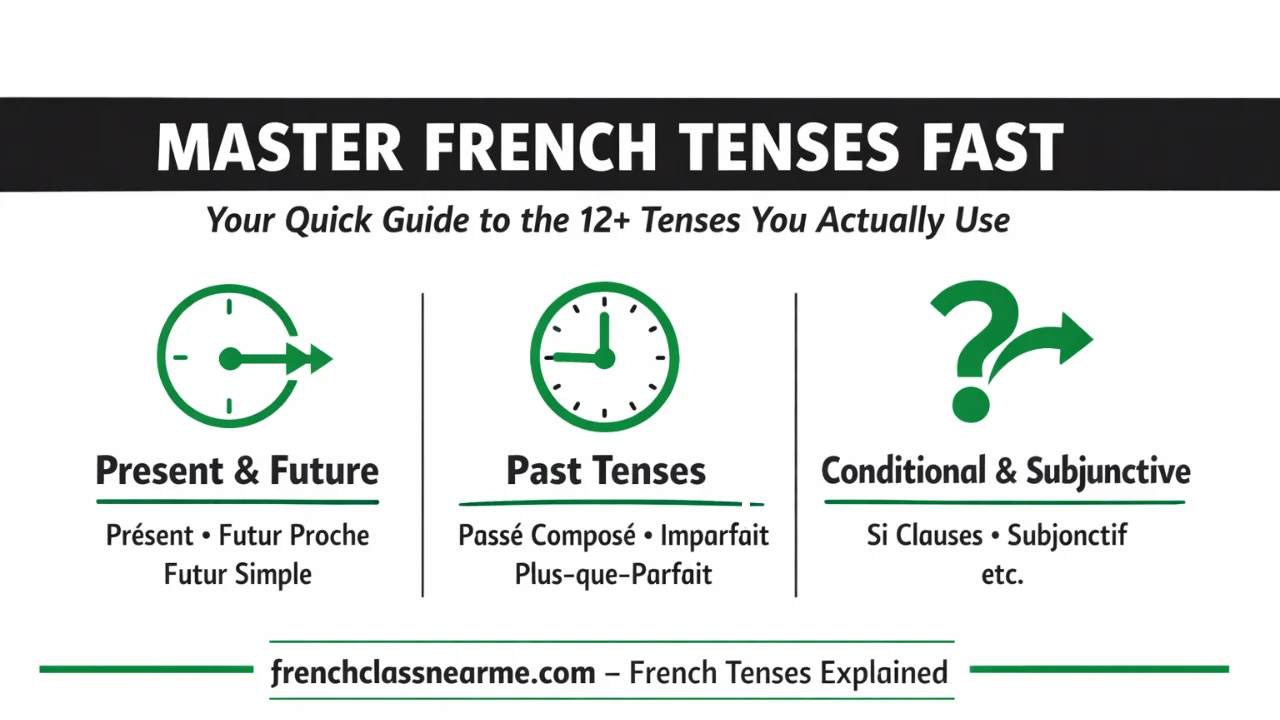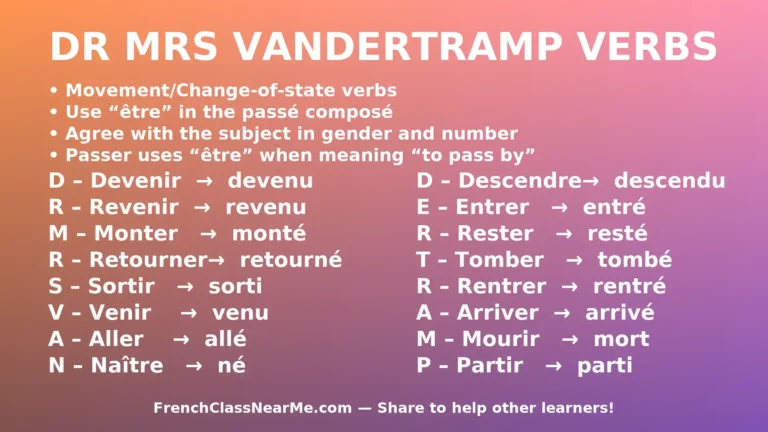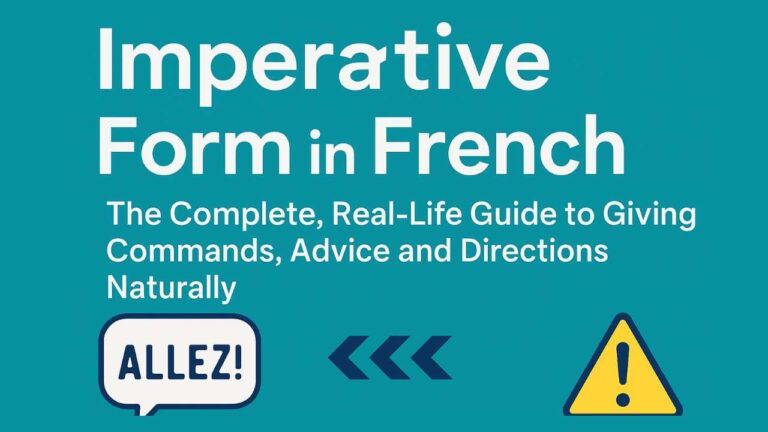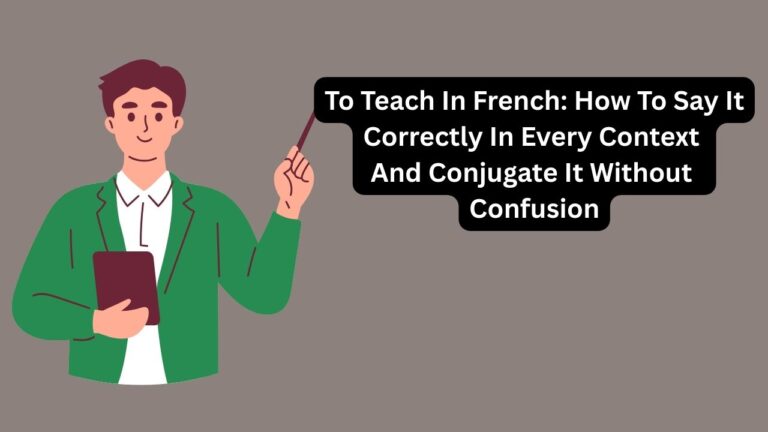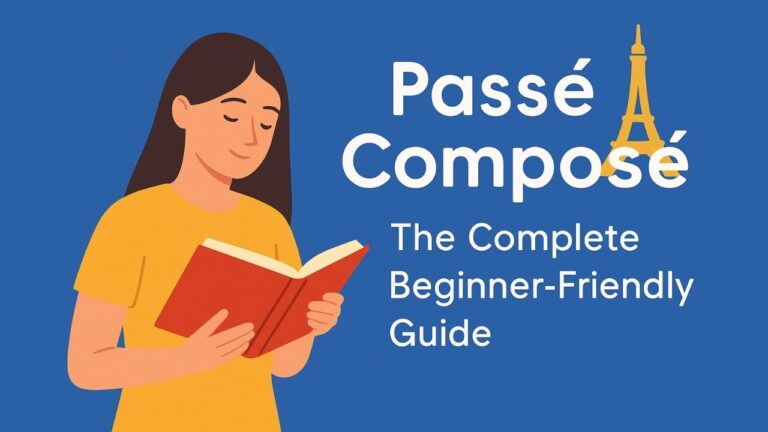French Tenses: How Many Tenses Are There In French?
Ever wondered how many tenses are there in French and why learners often get confused by the answer? If you’ve been grappling with conjugation charts, verb endings, and the mystery of French grammar, you’re not alone. This guide takes you deep into the structure of French tenses, breaking down how they work, how many truly exist, and how they’re used in everyday communication. You’ll learn the categories, examples, practical uses, and even some common pitfalls learners face.
Understanding The Basics Of French Tenses
Before we dive into exact numbers, let’s step back for a second. In French, a tense is simply a way to show when an action happens: past, present, or future. But French is more layered than that because it also includes moods—different ways to view or express an action, such as fact, doubt, command, or possibility. Each mood comes with its own set of tenses, which is why counting them isn’t as straightforward as it sounds.
Unlike English, where you might say “I eat, I ate, I will eat,” French verbs change endings and sometimes require an auxiliary verb (avoir or être) to form the correct tense. This system is rich, logical, but also intimidating for learners who expect a simple number.
How Many Tenses Are Officially Counted In French?
When learners ask how many tenses are there in French, they usually expect one number. The truth is, it depends on whether you include literary tenses. Traditionally, French grammar books list 24 tenses in total: 17 simple tenses and 7 compound tenses spread across four moods.
However, if you’re learning French today, you’ll only need about 12 to 16 tenses for real-life communication. The rest are mostly reserved for literature, history, or very formal writing. That’s why some teachers tell you there are “12 tenses in French” while others stick to the official 24. Both are correct—it just depends on perspective.
The Four Main Moods In French
Tenses in French are grouped into moods. Each mood represents a different way of looking at an action. Think of them like “filters” that change how the verb works.
- Indicative: For facts, statements, and certainty.
- Subjunctive: For doubt, emotion, uncertainty, or necessity.
- Conditional: For hypothetical or “would” situations.
- Imperative: For commands, advice, or instructions.
Now let’s look at how these moods break down into tenses.
Indicative Mood And Its Tenses
The indicative is the workhorse of French. It’s where most of your daily communication happens because it’s used to talk about real things: what you do, what you did, and what you will do.
Present Indicative
The present indicative expresses current actions or general truths. It’s also used for habits. Example:
- Je parle français (I speak French).
- Elle mange une pomme (She is eating an apple).
Conjugation example with parler (to speak):
- Je parle
- Tu parles
- Il/Elle parle
- Nous parlons
- Vous parlez
- Ils/Elles parlent
This tense is crucial because it forms the backbone of all communication.
Passé Composé
This is the star of past tenses in spoken French. It expresses completed actions.
- J’ai mangé une pizza (I ate a pizza).
- Ils ont visité Paris (They visited Paris).
It’s formed with avoir or être + past participle. Reflexive verbs and movement verbs use être:
- Je suis allé(e) (I went).
- Nous nous sommes réveillés (We woke up).
Imparfait
This tense sets the scene, describes ongoing actions, or talks about habits in the past.
- Quand j’étais enfant, je jouais dehors tous les jours (When I was a child, I used to play outside every day).
It contrasts with passé composé, which highlights specific completed events. A typical French story blends the two.
Plus-Que-Parfait
Think of this as “the past of the past.” It describes actions that happened before another past event.
- J’avais déjà mangé quand il est arrivé (I had already eaten when he arrived).
It’s formed with the imperfect of avoir/être + past participle.
Passé Simple
A purely literary tense, you’ll see it in novels and history books. Rarely spoken.
- Il entra dans la salle (He entered the room).
French children often learn to recognize it for reading, but they don’t use it in conversation.
Passé Antérieur
An even rarer literary tense. It pairs with passé simple in formal narratives.
- Dès qu’il eut terminé, il partit (As soon as he had finished, he left).
Futur Simple
This is the “proper” future tense.
- Je parlerai demain (I will speak tomorrow).
- Nous voyagerons en été (We will travel in summer).
Futur Antérieur
The future perfect expresses something that will have happened before another future action.
- Quand tu arriveras, j’aurai déjà fini (When you arrive, I will have already finished).
This tense is common in planning and formal writing.
Subjunctive Mood And Its Tenses
The subjunctive shows doubt, emotion, or subjectivity. It’s triggered by certain phrases like il faut que (it is necessary that), bien que (although), or je veux que (I want that).
Present Subjunctive
Used constantly in daily speech after these triggers.
- Il faut que tu viennes (You must come).
- Je doute qu’elle sache la réponse (I doubt she knows the answer).
Past Subjunctive
Expresses completed but uncertain actions.
- Je doute qu’il soit venu (I doubt he came).
Imperfect Subjunctive
Literary, almost never spoken.
- Il fallait qu’il parlât (It was necessary that he spoke).
Pluperfect Subjunctive
Another literary tense, mostly seen in older texts.
- Si je l’eusse su (If I had known).
Conditional Mood And Its Tenses
The conditional mood expresses possibility, politeness, or hypothetical outcomes.
Present Conditional
Equivalent to “would” in English.
- Je voudrais un café (I would like a coffee).
- Si j’avais de l’argent, je voyagerais (If I had money, I would travel).
Past Conditional
Equivalent to “would have.”
- J’aurais accepté si j’avais su (I would have accepted if I had known).
It’s very common in regrets or alternative scenarios.
Imperative Mood And Its Tense
The imperative is short and powerful—it only has the present tense.
- Mange! (Eat!)
- Allons-y! (Let’s go!)
Though simple, it’s everywhere in daily speech: recipes, directions, advice, and casual commands.
How French Tenses Are Grouped For Learners
Teachers often divide tenses into “useful for daily life” and “mainly literary.” Beginners typically focus on six tenses:
- Present
- Passé Composé
- Imparfait
- Futur Simple (or futur proche)
- Conditionnel Présent
- Subjonctif Présent
Once those are mastered, learners gradually add more advanced or literary tenses.
Which Tenses Are Most Important For Beginners?
If you’re just starting, stick to the essentials:
- Present for daily habits.
- Passé Composé for completed past actions.
- Imparfait for ongoing or descriptive past.
- Futur Proche (near future) for immediate plans.
- Conditionnel Présent for polite requests.
- Subjonctif Présent for emotions and necessity.
This toolkit already lets you express a wide range of ideas.
How Literary Tenses Fit Into French Learning
Literary tenses like passé simple or imparfait du subjonctif are not for daily speech, but they matter if you want to read novels, historical works, or academic texts. Advanced learners eventually encounter them, especially in French literature classes or exams.
How Many Tenses Do Native Speakers Actually Use?
Native speakers actively use about 10–12 tenses in speech and writing. The rest appear in books, speeches, or older contexts. This explains why French grammar sometimes feels “overloaded”—there’s a difference between what exists and what’s actively used.
The Role Of Compound Tenses In French
Compound tenses make up a huge part of French. They’re formed with auxiliaries (avoir or être) plus past participles. Examples:
- Passé Composé (j’ai mangé).
- Plus-Que-Parfait (j’avais mangé).
- Futur Antérieur (j’aurai mangé).
- Conditionnel Passé (j’aurais mangé).
If you master auxiliaries and participles, half the battle is won.
Common Struggles Learners Face With French Tenses
Learners often trip over:
- Passé Composé vs. Imparfait.
- Subjunctive triggers.
- Irregular verb conjugations.
- Choosing être or avoir as auxiliaries.
The good news? With practice, these become second nature.
Practical Tips To Master French Tenses
- Focus on context: Don’t just memorize forms—practice in sentences.
- Read stories: Notice how passé composé and imparfait interact.
- Listen to native speakers: You’ll hear futur proche far more than futur simple.
- Practice irregular verbs: Words like être, avoir, aller, faire are everywhere.
- Use flashcards or apps: Repetition helps cement patterns.
Now that we’ve unpacked the tense system, let’s move into the most asked questions about tenses in French.
FAQs About Tenses In French
Frequently Asked Questions About Tenses In French
What Makes French Verb Tenses Difficult To Master?
French verb tenses can feel tricky because they not only change based on time but also on mood, aspect, and conjugation rules. Irregular verbs add complexity, and spoken versus written forms don’t always match perfectly. Still, with practice, patterns become easier to recognize and use naturally.
How Many Tenses Are Used Daily In French?
In everyday spoken French, about six to seven tenses dominate conversations. These include the present, passé composé, imparfait, futur proche, futur simple, plus-que-parfait, and occasionally the conditional. Others, like passé simple or literary tenses, appear mostly in literature and formal writing rather than daily exchanges.
Is The French Subjunctive Really Necessary?
Yes, the subjunctive is necessary, though it feels intimidating at first. It’s essential when expressing doubt, desire, uncertainty, or emotion. French speakers use it often, especially in phrases like “il faut que” (it’s necessary that). While learners may skip it initially, mastery adds fluency and precision.
Why Does French Have So Many Tenses?
French inherited its tense system from Latin, which already had a complex structure. Over centuries, usage simplified but kept multiple forms to distinguish between written style, spoken communication, and nuanced meanings. These layers remain today, allowing speakers to express time, aspect, and intention more clearly.
Which French Tense Should Beginners Focus On First?
Beginners should start with the present tense since it covers both immediate and habitual actions. Next, moving to passé composé (for past) and futur proche (for near future) gives learners the ability to talk about almost anything in daily life without needing advanced forms immediately.
Are All French Tenses Equally Important?
Not at all. Some tenses, like passé simple and subjonctif imparfait, are rarely spoken and appear only in formal literature. In contrast, tenses like the present, passé composé, and futur proche dominate daily conversation. Prioritizing the most useful tenses helps learners communicate effectively early on.
How Do French Literary Tenses Differ From Spoken Ones?
Literary tenses like passé simple, passé antérieur, and imparfait du subjonctif are almost never spoken. Instead, they appear in novels, historical texts, and formal writing. Spoken French replaces them with passé composé or imparfait. This separation allows French literature to preserve tradition while keeping daily conversation simpler.
Can You Speak French Without Learning Every Tense?
Yes, you can speak French without mastering every tense. Many learners get by with six or seven core tenses. Native speakers naturally simplify when speaking with learners, and context often fills in the gaps. However, knowing additional tenses deepens comprehension, especially when reading books or newspapers.
How Is Passé Composé Different From Imparfait?
Passé composé describes completed actions, while imparfait sets the scene or expresses ongoing past events. For example, “J’ai mangé” (I ate) signals a finished act, while “Je mangeais” (I was eating) describes a past routine or background detail. Native speakers constantly switch between them depending on context.
Is Futur Proche More Common Than Futur Simple?
Yes, futur proche is far more common in spoken French. It expresses immediate or near-future actions and feels more conversational, like saying “I’m going to do it” in English. Futur simple appears more often in writing or when expressing long-term, formal, or hypothetical situations.
Do Kids In France Learn All Tenses At Once?
No, French children don’t learn every tense at once. They start with the present tense in daily speech, then gradually acquire passé composé, imparfait, and futur proche. More advanced or literary tenses come later in school, particularly during reading and writing lessons rather than in casual conversations.
Which French Tense Is Closest To English Past Perfect?
The French plus-que-parfait corresponds most closely to the English past perfect. It describes an action completed before another past event, such as “J’avais déjà mangé” (I had already eaten). Learners find it straightforward once they understand passé composé and imparfait since it combines similar rules.
How Many Tenses Exist In French Literature?
French literature traditionally employs around seventeen tenses across different moods, though many are rare today. These include the passé simple, passé antérieur, and imparfait du subjonctif. While still taught in schools, their practical usage is mostly confined to books, essays, and academic writing rather than conversation.
Is Passé Simple Still Worth Learning?
Yes, passé simple is worth learning if you plan to read French novels, especially classics. It doesn’t appear in everyday conversation, but authors frequently use it for narrative storytelling. Even if you don’t use it in speech, recognizing it improves reading comprehension significantly.
How Do You Know When To Use Subjunctive Or Indicative?
The subjunctive is used for expressions of doubt, uncertainty, desire, or emotion, while the indicative handles facts and certainties. For example, “Je pense qu’il vient” (I think he’s coming) uses indicative, while “Je doute qu’il vienne” (I doubt he’s coming) requires the subjunctive.
What Are The Compound Past Tenses In French?
French has several compound past tenses, including passé composé, plus-que-parfait, passé antérieur, and futur antérieur. These forms combine an auxiliary verb (avoir or être) with a past participle. While passé composé dominates spoken French, the others appear in literature or more formal contexts to show sequence and completion.
Why Is Futur Antérieur Important?
Futur antérieur expresses an action that will have been completed before another future moment. For example, “J’aurai fini avant dix heures” (I will have finished before ten). It helps speakers show sequence in future events and often appears in both formal writing and advanced-level conversations.
What’s The Difference Between Conditional And Future Tenses?
The future tense describes what will happen, while the conditional describes what would happen under certain conditions. For example, “Je partirai demain” (I will leave tomorrow) is definite, while “Je partirais si j’avais le temps” (I would leave if I had time) depends on a condition.
Do Native Speakers Use Subjonctif Imparfait?
Almost never in daily life. Subjonctif imparfait is primarily a literary tense and rarely spoken, even among educated French speakers. Its use is now considered old-fashioned. Most people substitute present subjunctive or other structures when expressing similar ideas in conversation.
How Is Passé Antérieur Different From Plus-Que-Parfait?
Both describe events that happened before another past action, but passé antérieur is strictly literary, while plus-que-parfait is widely used in speech and writing. Passé antérieur typically replaces plus-que-parfait in narratives written with passé simple, keeping the stylistic consistency within formal or historical storytelling.
Which French Tenses Are Essential For Travel Conversations?
For travelers, the present tense, passé composé, futur proche, and imparfait are the most essential. These allow you to order food, describe experiences, make plans, and share past events. More advanced tenses aren’t necessary for functional communication while traveling around French-speaking countries.
Do French Speakers Mix Tenses Incorrectly?
Native speakers rarely “mix” tenses incorrectly, but they do simplify in casual conversation. Instead of strictly applying grammar rules, they may rely on context. For example, passé composé replaces passé simple in spoken French, even though both are technically correct depending on formality.
How Do Reflexive Verbs Affect Tenses?
Reflexive verbs add an extra layer to conjugation since they always require être as the auxiliary in compound tenses. For instance, “Je me suis réveillé” (I woke up) uses a reflexive pronoun. They follow standard tense rules but require agreement in gender and number more often.
Which Tense Is Used For Hypothetical Scenarios?
The conditional is typically used for hypothetical scenarios, especially when paired with “si” clauses. For example, “Si j’avais de l’argent, j’achèterais une voiture” (If I had money, I would buy a car). This structure allows speakers to express possibility without committing to certainty.
How Important Is It To Memorize Conjugation Tables?
Memorizing conjugation tables helps initially, but it shouldn’t be the sole focus. Over time, exposure through reading, listening, and speaking reinforces the forms naturally. Irregular verbs still require some memorization, but consistent practice makes conjugation feel intuitive instead of a tedious memory exercise.
Do All French Verbs Follow The Same Tense Rules?
Not exactly. Regular verbs follow predictable patterns in -er, -ir, and -re groups, but irregular verbs break these rules. High-frequency irregular verbs like “avoir,” “être,” and “aller” require special attention since they appear in nearly every tense and mood across different contexts.
How Do Compound Tenses Work With Être And Avoir?
Most verbs use avoir in compound tenses, but certain verbs, especially movement and reflexive verbs, require être. For example, “j’ai parlé” (I spoke) uses avoir, while “je suis allé” (I went) uses être. Agreement in gender and number applies more strictly with être.
Which French Tense Do Learners Struggle With Most?
Many learners struggle with the subjunctive mood because it doesn’t always translate directly into English. Others find the difference between passé composé and imparfait challenging since English often uses the simple past for both. These difficulties fade with practice and exposure to authentic French.
Why Is Passé Composé So Common?
Passé composé dominates spoken French because it neatly expresses completed past actions. It’s simpler and more flexible than passé simple, which has become almost exclusively literary. Learners can master basic storytelling and daily conversation by focusing on passé composé alongside the imparfait.
What Role Does Context Play In Choosing Tenses?
Context is crucial in French tense selection. A verb form that seems correct grammatically may sound odd in certain situations. For instance, futur simple feels formal in conversation, while futur proche sounds more natural. Native speakers instinctively adjust their tense choice based on formality and tone.
How Are Tenses Taught In French Schools?
French children learn tenses gradually, beginning with the present, then passé composé, imparfait, and futur proche. As they progress, they’re introduced to literary tenses and subjunctive forms, especially during reading and writing exercises. This staged approach mirrors how second-language learners should approach tense learning.
Do Different French-Speaking Countries Use Tenses Differently?
Yes, regional variation exists. For example, Canadian French often retains some older forms and may use certain tenses slightly differently than European French. However, the overall tense system remains consistent, ensuring mutual understanding between French speakers regardless of country or region.
Can You Avoid Using Subjunctive Altogether?
Technically, yes—you can often rephrase sentences to avoid the subjunctive. However, this limits expression and sounds unnatural in some contexts. For example, “Il faut que tu viennes” (You must come) can’t easily be replaced without changing meaning. Learning subjunctive makes communication more natural and precise.
Is The Conditional Always Required In “Si” Clauses?
Not always. French “si” clauses follow specific patterns: present tense pairs with future or imperative, while imparfait pairs with conditional, and plus-que-parfait pairs with past conditional. Each structure signals different degrees of possibility, from real conditions to purely hypothetical scenarios.
Which Tense Is Most Useful For Storytelling?
Imparfait and passé composé work together for storytelling. Imparfait sets the scene or describes background actions, while passé composé narrates the main events. For instance: “Il faisait froid. J’ai allumé le feu.” (It was cold. I lit the fire.) This combination mirrors English narrative structure.
What Are The Rarest Tenses In French?
The rarest tenses include passé antérieur, imparfait du subjonctif, and plus-que-parfait du subjonctif. These are mostly confined to classical literature and academic settings. While they still appear in grammar books, learners rarely need to master them unless they aim to study French literature in depth.
Do French Tenses Have Direct English Equivalents?
Not always. While some tenses align well, like futur simple with “will,” others don’t map perfectly. For instance, the French imparfait doesn’t have an exact English equivalent, often translating to “was doing” or “used to do.” Understanding nuance matters more than one-to-one translations.
How Does Futur Proche Compare To English Structures?
Futur proche closely matches the English “going to” construction. For example, “Je vais manger” means “I am going to eat.” Its simplicity and familiarity make it one of the first future tenses learners pick up, and it’s heavily used in casual spoken French.
Are Compound Tenses Always Necessary?
Compound tenses aren’t always necessary but add precision when describing sequences or completed actions. For everyday speech, simple tenses and context often suffice. Still, compound tenses like passé composé and futur antérieur play key roles in organizing past and future narratives with greater clarity.
How Does Plus-Que-Parfait Work In Conversations?
Plus-que-parfait appears in conversations to show that something had already happened before another past event. For example, “J’avais fini mes devoirs quand il est arrivé” (I had finished my homework when he arrived). It makes storytelling smoother and ensures the sequence of events is clear.
Do French Songs Use All Tenses?
Not all. French songs often favor present, future, and passé composé because they resonate emotionally and are easier to sing. Occasionally, songwriters include imperfect for atmosphere or conditional for dreaming. Literary or highly complex tenses rarely appear in music since clarity and rhythm matter more.
Is It Possible To Speak French Fluently Without Literary Tenses?
Yes, absolutely. Most French learners achieve fluency without ever actively using literary tenses like passé simple. Since these appear only in formal writing, learners can focus on the six or seven most common spoken tenses. Recognizing literary tenses, however, remains helpful for reading comprehension.
Conclusion
So, how many tenses are there in French? Officially, 24 are recognized, but in practice, only about 12 matter for daily use. Learners don’t need to worry about mastering every single tense at once—focusing on the essentials is more than enough for fluency. Over time, as your French deepens, you’ll naturally encounter the literary tenses and unlock the beauty of the full system.

